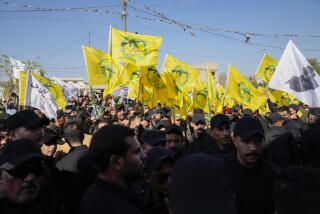Is Iran’s military ‘terrorist’?
- Share via
President Bush isn’t the only one shaking his fist at Iran these days. Getting tough with Tehran is an increasingly popular bipartisan sport in Washington. Both the House and Senate have called on the administration to designate Iran’s Revolutionary Guard a terrorist organization. Although those congressional resolutions lack the force of law, critics, including Sen. Barack Obama (D-Ill.), worry that they could be construed by the White House as legal justification for U.S. attacks on Revolutionary Guard targets in Iran.
A terrorist designation by the State Department would allow the United States to levy sanctions against foreign companies and financial institutions that do business with the elite Guard. (American companies are already prevented from doing business with Iran.) But the administration appears to have misgivings about the terrorist designation -- and for good reason.
No nation’s armed forces have ever been formally labeled “terrorist,” though Iran has been on the State Department’s list of countries that sponsor terrorism since 1984. Such a designation for the Revolutionary Guard, a 125,000-member military and intelligence force, would be a radical move that could have unforeseen consequences. Former Guard officers hold 14 of the 21 seats in the Iranian Cabinet, 80 of the 290 seats in the parliament and a host of other political and appointed offices. It’s often unclear -- at least to the intelligence-challenged United States -- who is currently a Guard officer, who is an alumnus and what are the relationships between any current or former Guardsman and the group’s multibillion-dollar business ventures.
Moreover, the terrorist designation would make it even more difficult to find senior Iranian leaders who could negotiate with the United States or Europe. Ali Larijani, Iran’s chief nuclear negotiator, is a former Guardsman, and the U.S. has accused the Iranian ambassador to Iraq of hiding his current membership in the Guard.
Rather than risking over-broad new sanctions, it would be wiser for the Treasury Department to target those Iranian officials known to be involved in terrorist activities or in specific business ventures whose proceeds fund the country’s nuclear program. Or it might focus on specific units of the Guard, such as the notorious Quds Force, which is accused of arming Iraqi insurgents. But far more important than fashioning more U.S. penalties that other countries will ignore is gaining the cooperation of German, Chinese and Russian officials in enforcing existing sanctions. Taking the prospect of a U.S. military strike against Iran off the table, at least for the duration of the Bush administration, could help.
Escalating hostilities will not advance what must be the primary U.S. goal: deterring Iran from acquiring nuclear weapons and thus destabilizing the entire Middle East. Tehran must decide that keeping its nuclear program is not worth the cost in economic and political isolation. And Washington must decide what it is willing to offer Russia and China to induce their cooperation in constraining Iran’s nuclear ambitions.
Meanwhile, Congress should make clear that it will not countenance a disastrous expansion of the Iraq war to Iran. It should start by passing legislation written by Sen. Jim Webb (D-Va.) and co-sponsored by Sen. Hillary Rodham Clinton (D-N.Y.) that prohibits the use of U.S. funds for military operations in Iran, its airspace or waters without specific congressional authorization. The bill carefully leaves exceptions for intelligence, hot pursuit and repelling an Iranian attack. It may not suffice to prevent a deliberate or unwitting clash with Iran -- but it is an essential first step.
More to Read
Sign up for Essential California
The most important California stories and recommendations in your inbox every morning.
You may occasionally receive promotional content from the Los Angeles Times.










